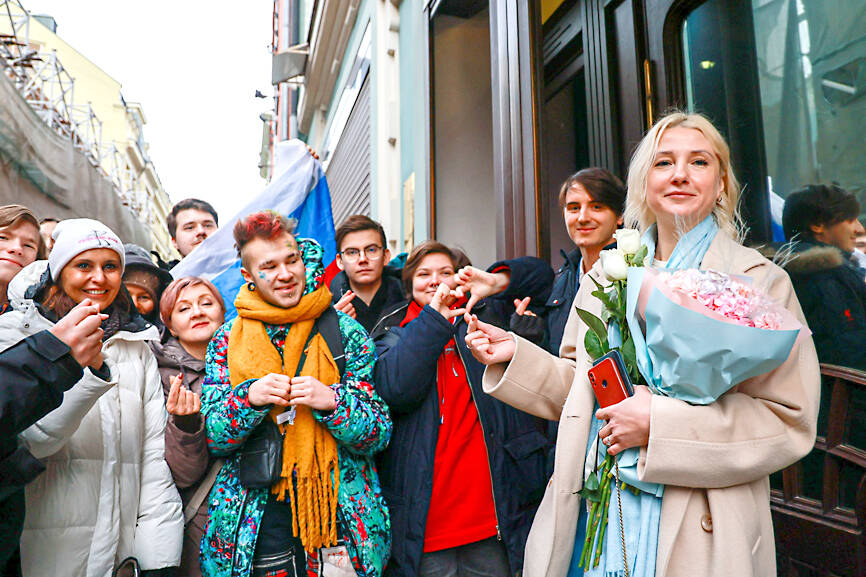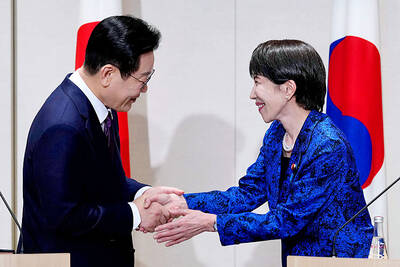The Russsian Central Electoral Commission on Saturday rejected an application by a candidate calling for peace to stand in next year’s presidential elections.
The commission cited “mistakes in documents” submitted by Yekaterina Duntsova, a former journalist and city councilor campaigning “for peace and democratic processes,” Russian television reported.
Commission chairwoman Ella Pamfilova said the members unanimously rejected Duntsova’s bid to stand in polls that Russian President Vladimir Putin is expected to win comfortably.

Photo: AFP
Putin confirmed this month that he would participate in the election, which is to be held over three days beginning March 15.
The commission said Duntsova could not go on to the next stage of gathering thousands of supporters’ signatures.
“You are a young woman, you have everything ahead of you,” Pamfilova told her.
Duntsova, 40, had filed documents to stand in the March race as an independent candidate. She was required to provide documents proving that a group of at least 500 people had held a meeting backing her.
“A people’s initiative is not needed, is not welcomed,” Duntsova told journalists afterward, saying she would not have time to file another application as an independent candidate.
She wrote on social media that she would file an appeal against the ruling with the Russian Supreme Court.
She also urged the leadership of Russian United Democratic Party Yabloko to nominate her as its candidate.
Yabloko, Russia’s oldest democratic party, “should not stand on the sidelines. Russians should have a choice,” she wrote on Telegram.
Duntsova told journalists on Saturday “we are now waiting for some official, public answer on whether [Yabloko] are prepared to support me so we meet the deadline” of Jan. 1.
Yabloko cofounder Grigory Yavlinsky said in a YouTube video broadcast on Saturday that the party is not nominating a candidate.
The 71-year-old was unable to comment on Duntsova’s request for nomination, saying he “had no idea” about her.
Candidates from political parties lacking lawmakers in the national parliament, such as Yabloko, have a less arduous procedure to participate than independents. They have to gather signatures of 100,000 supporters by the end of January, while independent candidates have to find 300,000.
Duntsova said she was sure her supporters had no illusions about the outcome of the presidential “elections” in inverted commas.
However, “you must not do nothing,” as standing as a candidate is the “last legal opportunity for citizens to express their disagreement with the policies of the current authorities,” she wrote on Telegram.
Pamfilova on Saturday said that 29 people have filed to run for the presidency.
Moscow has for years sidelined opposition figures from elections and political life, a clampdown that accelerated after the Kremlin ordered Russian troops into Ukraine last year.

Indonesia and Malaysia have become the first countries to block Grok, the artificial intelligence (AI) chatbot developed by Elon Musk’s xAI, after authorities said it was being misused to generate sexually explicit and nonconsensual images. The moves reflect growing global concern over generative AI tools that can produce realistic images, sound and text, while existing safeguards fail to prevent their abuse. The Grok chatbot, which is accessed through Musk’s social media platform X, has been criticized for generating manipulated images, including depictions of women in bikinis or sexually explicit poses, as well as images involving children. Regulators in the two Southeast Asian

COMMUNIST ALIGNMENT: To Lam wants to combine party chief and state presidency roles, with the decision resting on the election of 200 new party delegates next week Communist Party of Vietnam General Secretary To Lam is seeking to combine his party role with the state presidency, officials said, in a move that would align Vietnam’s political structure more closely to China’s, where President Xi Jinping (習近平) heads the party and state. Next week about 1,600 delegates are to gather in Hanoi to commence a week-long communist party congress, held every five years to select new leaders and set policy goals for the single-party state. Lam, 68, bade for both top positions at a party meeting last month, seeking initial party approval ahead of the congress, three people briefed by

The Chinese Embassy in Manila yesterday said it has filed a diplomatic protest against a Philippine Coast Guard spokesman over a social media post that included cartoonish images of Chinese President Xi Jinping (習近平). Philippine Coast Guard spokesman Jay Tarriela and an embassy official had been trading barbs since last week over issues concerning the disputed South China Sea. The crucial waterway, which Beijing claims historic rights to despite an international ruling that its assertion has no legal basis, has been the site of repeated clashes between Chinese and Philippine vessels. Tarriela’s Facebook post on Wednesday included a photo of him giving a

NONCOMMITTAL: South Korea’s president said the world could only wait for China and Japan to resolve matters amicably through dialogue to secure regional peace Japanese Prime Minister Sanae Takaichi yesterday called on South Korean President Lee Jae-myung to help “ensure regional stability,” as Beijing pressures Tokyo over its stance on Taiwan. The two leaders met in Takaichi’s picturesque home region of Nara in western Japan, days after Lee visited Chinese President Xi Jinping (習近平) in Beijing. They agreed to strengthen cooperation on economic security, regional and global issues, as well as artificial intelligence, South Korea’s presidential office said. Looming in the background of the meeting was Japan’s heated diplomatic spat with China, triggered by Takaichi’s suggestion in November that Tokyo could intervene militarily if China attacks Taiwan. China